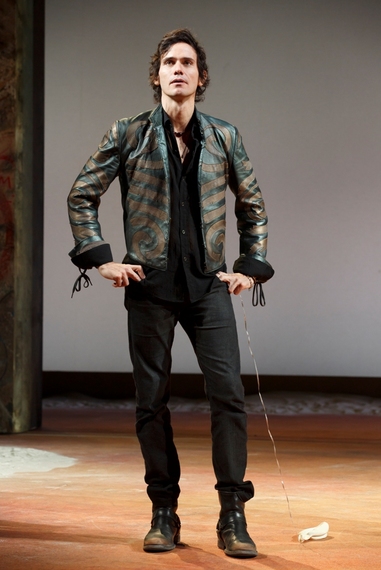The Broadway production of Romeo and Juliet offers a new view on a storied tale. Among the standout performers is Christian Camargo, in the role of Mercutio, who capitalizes on his side role as Romeo's best friend and confidant. Here's a look inside what went into this production's creation, courtesy of Camargo:
What made you interested in this role?
Camargo: I've always wanted to play this role. Mercutio is as refined as he is course. Unpredictable. A character of extremes. It also helps that Shakespeare gave him the gift of gab ... and mab.
Have you performed Shakespeare before?
Camargo: I've played Hamlet and Coriolanus, Orlando in As You like It and Ariel in Tempest, among others. It all began when Mark Rylance invited me to be a part of the inaugural production of Henry V at the Globe. It was there I met the queen of England dressed as the queen of France. But that's another story.
Your character, Mercutio, only appears in a handful of scenes, but he really packs a punch in this production. How did you conceive of him?
Camargo: David Leveaux, Fabio Toblini (costume director) and I settled on Keith Richards as a template to begin. There's something mysterious and playful about Richards which works for Mercutio. In my mind, Mercutio commands every space he's in. He challenges everything, desperate to be heard and seen. Romeo's seeming betrayal in befriending Tybalt destroys him. A powerful personality that's incredibly fun to play.
![2013-12-02-0435_RomeoJulietcCarolRosseg.jpg]()
(photo courtesy of Carol Rosegg)
The director took a famous play and set it with a more modern backdrop and contemporary costumes. Did this affect how you approached your role?
Camargo: Yes. The contemporary setting allows me to play with the physicality as well as some meaning within the lines. I'm able to give some words a contemporary slang like interpretation. I say Shakespeare's lines but the meaning isn't necessarily Elizabethan. "Blow" changes from a violent connotation to a sexual connotation. "Fiddlestick" changes from "sword" to ... well, you can imagine.
Some of the action spills over into the audience, with characters coming and going through the aisles. What impact does that have on the movement of the play itself?
Camargo: I see theater as a simple formula. Audience plus players plus story makes the play. Without one there's no show. Each is as equally important as the other. Entering through the audience links all three together. It also takes away the presentational perception of a Shakespearean play; these proscenium stages can seem distant at times, and David wanted to break this. He wanted the audience to feel like they were part of this other world.
Why do you think Romeo & Juliet is considered to be the quintessential love story?
Camargo: For reasons I don't fully understand, tragic love has a certain appeal. The play has some of the most romantic language ever written. We absorb the words as the lovers absorb each other. In the end, we're all romantics. Even the pragmatics. Even Mercutio.
What made you interested in this role?
Camargo: I've always wanted to play this role. Mercutio is as refined as he is course. Unpredictable. A character of extremes. It also helps that Shakespeare gave him the gift of gab ... and mab.
Have you performed Shakespeare before?
Camargo: I've played Hamlet and Coriolanus, Orlando in As You like It and Ariel in Tempest, among others. It all began when Mark Rylance invited me to be a part of the inaugural production of Henry V at the Globe. It was there I met the queen of England dressed as the queen of France. But that's another story.
Your character, Mercutio, only appears in a handful of scenes, but he really packs a punch in this production. How did you conceive of him?
Camargo: David Leveaux, Fabio Toblini (costume director) and I settled on Keith Richards as a template to begin. There's something mysterious and playful about Richards which works for Mercutio. In my mind, Mercutio commands every space he's in. He challenges everything, desperate to be heard and seen. Romeo's seeming betrayal in befriending Tybalt destroys him. A powerful personality that's incredibly fun to play.

(photo courtesy of Carol Rosegg)
The director took a famous play and set it with a more modern backdrop and contemporary costumes. Did this affect how you approached your role?
Camargo: Yes. The contemporary setting allows me to play with the physicality as well as some meaning within the lines. I'm able to give some words a contemporary slang like interpretation. I say Shakespeare's lines but the meaning isn't necessarily Elizabethan. "Blow" changes from a violent connotation to a sexual connotation. "Fiddlestick" changes from "sword" to ... well, you can imagine.
Some of the action spills over into the audience, with characters coming and going through the aisles. What impact does that have on the movement of the play itself?
Camargo: I see theater as a simple formula. Audience plus players plus story makes the play. Without one there's no show. Each is as equally important as the other. Entering through the audience links all three together. It also takes away the presentational perception of a Shakespearean play; these proscenium stages can seem distant at times, and David wanted to break this. He wanted the audience to feel like they were part of this other world.
Why do you think Romeo & Juliet is considered to be the quintessential love story?
Camargo: For reasons I don't fully understand, tragic love has a certain appeal. The play has some of the most romantic language ever written. We absorb the words as the lovers absorb each other. In the end, we're all romantics. Even the pragmatics. Even Mercutio.